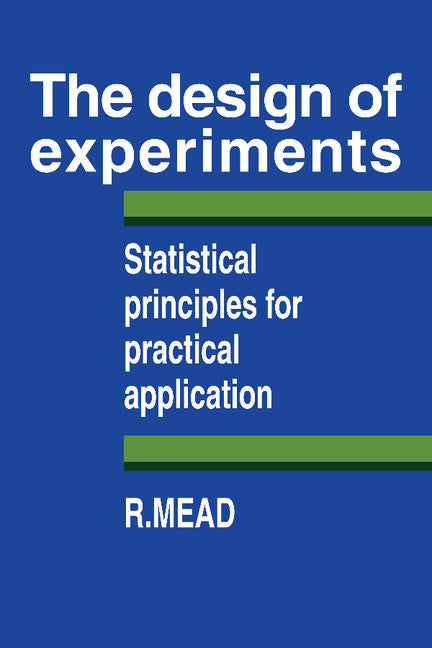Freshly Printed - allow 8 days lead
Couldn't load pickup availability
The Design of Experiments
Statistical Principles for Practical Applications
R. Mead (Author)
9780521287623, Cambridge University Press
Paperback, published 26 July 1990
636 pages
22.9 x 15.2 x 3.6 cm, 0.92 kg
"A systematic and comprehensive coverage of statistical principles as applied to the design of scientific experiments...The book is well-written and contains very useful information that is relevant to a variety of scientific disciplines." Choice
In all the experimental sciences, good design of experiments is crucial to the success of research. Well-planned experiments can provide a great deal of information efficiently and can be used to test several hypotheses simultaneously. This book is about the statistical principles of good experimental design and is intended for all applied statisticians and practising scientists engaged in the design, implementation and analysis of experiments. Professor Mead has written the book with the emphasis on the logical principles of statistical design and employs a minimum of mathematics. Throughout he assumes that the large-scale analysis of data will be performed by computers and he is thus able to devote more attention to discussions of how all of the available information can be used to extract the clearest answers to many questions. The principles are illustrated with a wide range of examples drawn from medicine, agriculture, industry and other disciplines. Numerous exercises are given to help the reader practise techniques and to appreciate the difference that good design of experiments can make to a scientific project.
Preface
Part I. Overture: 1. Introduction
2. Elementary ideas of blocking: the randomised block design
3. Elementary ideas of treatment structure
4. General principles of linear models for the analysis of experimental data
5. Computers for analysing experimental data
Part II. First Subject: 6. Replication
7. Blocking
8. Multiple blocking systems and cross-over designs
9. Randomisation
10. Covariance - extension of linear models
11. Model assumptions and more general models
Part III. Second Subject: 12. Experimental objectives, treatments and treatment structures
13. Factorial structure and particular forms of effects
14. Split unit designs and repeated measurements
15. Incomplete bloxk size for factorial experiments
16. Some mathematical theory for comfounding and fractional replication
17. Quantitative factors and response functions
18. Response surface exploration
Part IV. Coda: 19. Designing useful experiments
References
Index.
Subject Areas: Maths for engineers [TBJ], Maths for scientists [PDE], Probability & statistics [PBT]


